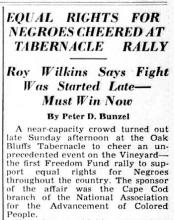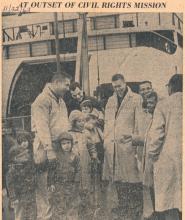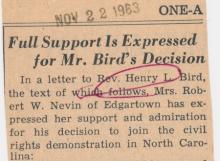“Mainly we’re taking food and morale,” Mrs. Stanley Murphy of Chilmark remarked on Tuesday, on the eve of the departure of five Vineyard women - Mrs. David E. Lilienthal Jr., Mrs. Henry C. Smith, Mrs. Nancy Hodgson, Mrs. Milton Mazer, and Mrs. Murphy - for Williamston, N. C., that southern community in which the segregated black population has become allied with the Vineyard in a freedom movement.
Food and morale for Williamston; and for the Vineyard and the world at large heightened awareness of the problem Williamston represents - these were the objectives of a journey in two cars carrying besides the Island women, 450 to 500 pounds of canned goods, boxes of clothing, and books, especially books for children, as the beginning of a freedom library in Williamston.
Williamston Very Isolated
Though all five women are members of the N.A.A.C.P., and although the Southern Christian Leadership Conference cooperated in such matters as routing, the expedition is that of five individuals in exercise of their conscience and their view of democracy and human rights. Williamston, one of the group said, is very isolated, and in a sense the Vineyard too is isolated. The expedition is intended to emphasize that both, isolation notwithstanding, are part of the world.
The expedition planned to leave on the early ferry Wednesday morning and to reach Washington that night, with the members stopping overnight as the guests of the Michael Straights of Chilmark and Washington. The itinerary called for arrival at Williamston on Thursday, and there the Vineyarders were sure of being among friends in the black community. Where they would spend the night was a matter to be decided after their arrival.
They planned to leave Williamston this afternoon, and they should be arriving sometime tomorrow.
The friendship between black Williamston and the Vineyard began in November when Rev. Henry L. Bird, rector of the Episcopal Parish on Martha’s Vineyard, joined a group of New England clergymen and others in a freedom trip to that town. Mr. Bird was one of those jailed during the demonstration. On Nov. 22 Dr. Robert W. Nevin joined a Williamston pilgrimage, designing his action to make clear the broader aspects of the freedom drive, and the commitment of laymen as well as ministers.
Still later, a group of Williamston blacks visited the Vineyard and made a deep impression of their sincerity and their very evident deprivation of Constitutional and human rights.
Williamston is a rural community of about 6,000 inhabitants about equally divided between blacks and whites. Freedom demonstrations had been carried on there prior to the demonstrations in which Mr. Bird took part, and these have continued. Paul Chapman, East Chop summer resident, who is director of the Packard Manse Ecumenical Centers at Stoughton and Roxbury, has made six trips to Williamston, and on the evening of April 15 spoke of his experiences to the Vineyard N.A.A.C.P.
He said that many Williamston blacks had lost their jobs, they there have been recurring instances of violence, and that white resentment is causing economic and social injustices. All the Vineyard participation has been in accord with the principles of non-resistance and non-violence advocated by Rev. Martin Luther King and the S.C.L.C.
All five of the women in the present expedition are prominent on the Vineyard.











Comments